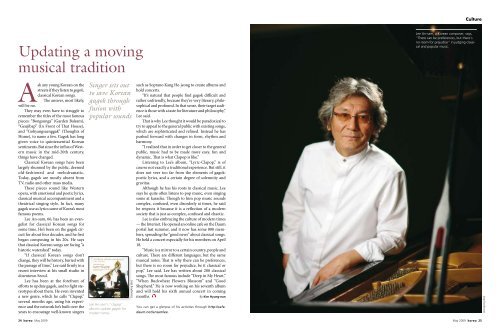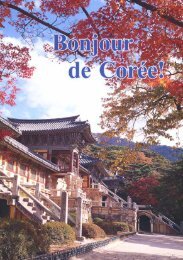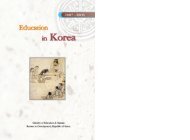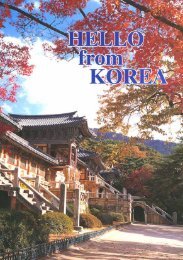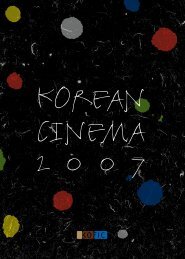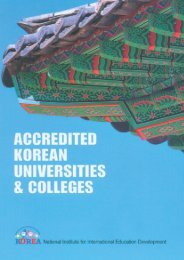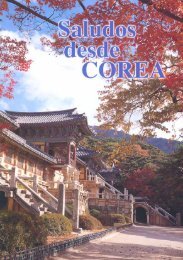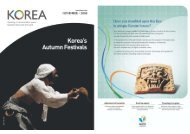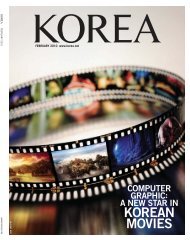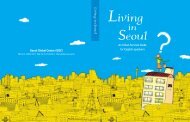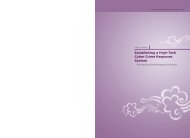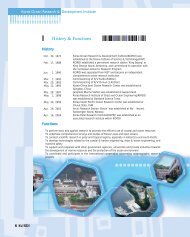2005-2162 The Buddha’s birthday illuminates Seoul
The Buddha's birthday illuminates Seoul - Korea.net
The Buddha's birthday illuminates Seoul - Korea.net
- No tags were found...
Create successful ePaper yourself
Turn your PDF publications into a flip-book with our unique Google optimized e-Paper software.
Culture<br />
Updating a moving<br />
musical tradition<br />
Lee An-sam, a Korean composer, says,<br />
“<strong>The</strong>re can be preferences, but there’s<br />
no room for prejudice” in judging classical<br />
and popular music.<br />
Ask any young Korean on the<br />
streets if they listen to gagok,<br />
classical Korean songs.<br />
<strong>The</strong> answer, most likely,<br />
will be no.<br />
<strong>The</strong>y may even have to struggle to<br />
remember the titles of the most famous<br />
pieces: “Bongsunga” (Garden Balsam),<br />
“Geujibap” (In Front of That House),<br />
and “Gohyangsaenggak” (Thoughts of<br />
Home), to name a few. Gagok has long<br />
given voice to quintessential Korean<br />
sentiments. But since the influx of Western<br />
music in the mid-20th century,<br />
things have changed.<br />
Classical Korean songs have been<br />
largely shunned by the public, deemed<br />
old-fashioned and melodramatic.<br />
Today, gagok are mostly absent from<br />
TV, radio and other mass media.<br />
<strong>The</strong>se pieces sound like Western<br />
opera, with emotional and poetic lyrics,<br />
classical musical accompaniment and a<br />
theatrical singing style. In fact, many<br />
gagok use as lyrics some of Korea’s most<br />
famous poems.<br />
Lee An-sam, 66, has been an evangelist<br />
for classical Korean songs for<br />
some time. He’s been on the gagok circuit<br />
for about four decades, and he first<br />
began composing in his 20s. He says<br />
that classical Korean songs are facing “a<br />
historic watershed” today.<br />
“If classical Korean songs don’t<br />
change, they will be history, buried with<br />
the passage of time,” Lee said firmly in a<br />
recent interview at his small studio in<br />
downtown <strong>Seoul</strong>.<br />
Lee has been at the forefront of<br />
efforts to update gagok, and to fight stereotypes<br />
about them. He even invented<br />
a new genre, which he calls “Clapop,”<br />
several months ago, using his experience<br />
and the network he’s built over the<br />
years to encourage well-known singers<br />
Singer sets out<br />
to save Korean<br />
gagok through<br />
fusion with<br />
popular sounds<br />
Lee An-sam’s “clapop”<br />
albums update gagok for<br />
modern times.<br />
[JoongAng Ilbo]<br />
such as Soprano Kang He-jeong to create albums and<br />
hold concerts.<br />
“It’s natural that people find gagok difficult and<br />
rather unfriendly, because they’re very literary, philosophical<br />
and profound. In that sense, their target audience<br />
is those with a taste for literature and philosophy,”<br />
Lee said.<br />
That is why Lee thought it would be paradoxical to<br />
try to appeal to the general public with existing songs,<br />
which are sophisticated and refined. Instead he has<br />
pushed forward with changes in form, rhythm and<br />
harmony.<br />
“I realized that in order to get closer to the general<br />
public, music had to be made more easy, fun and<br />
dynamic. That is what Clapop is like.”<br />
Listening to Lee’s album, “Lyric-Clapop,” is of<br />
course not exactly a traditional experience. But still, it<br />
does not veer too far from the elements of gagok:<br />
poetic lyrics, and a certain degree of solemnity and<br />
gravitas.<br />
Although he has his roots in classical music, Lee<br />
says he quite often listens to pop music, even singing<br />
some at karaoke. Though to him pop music sounds<br />
complex, confused, even disorderly at times, he said<br />
he respects it because it is a reflection of a modern<br />
society that is just as complex, confused and chaotic.<br />
Lee is also embracing the culture of modern times<br />
— the Internet. He opened an online cafe on the Daum<br />
portal last summer, and it now has some 800 members,<br />
spreading the “good news” about classical songs.<br />
He held a concert especially for his members on April<br />
18.<br />
“Music is a mirror to a certain country, people and<br />
culture. <strong>The</strong>re are different languages, but the same<br />
musical notes. That is why there can be preferences,<br />
but there is no room for prejudice, be it classical or<br />
pop,” Lee said. Lee has written about 200 classical<br />
songs. <strong>The</strong> most famous include “Deep in My Heart,”<br />
“When Buckwheat Flowers Blossom” and “Good<br />
Shepherd.” He is now working on his seventh album<br />
and will hold his sixth annual concert in coming<br />
months. By Kim Hyung-eun<br />
You can get a glimpse of his activities through http://cafe.<br />
daum.net/ansamlee.<br />
[joongAng Ilbo]<br />
24 korea May 2009 May 2009 korea 25


